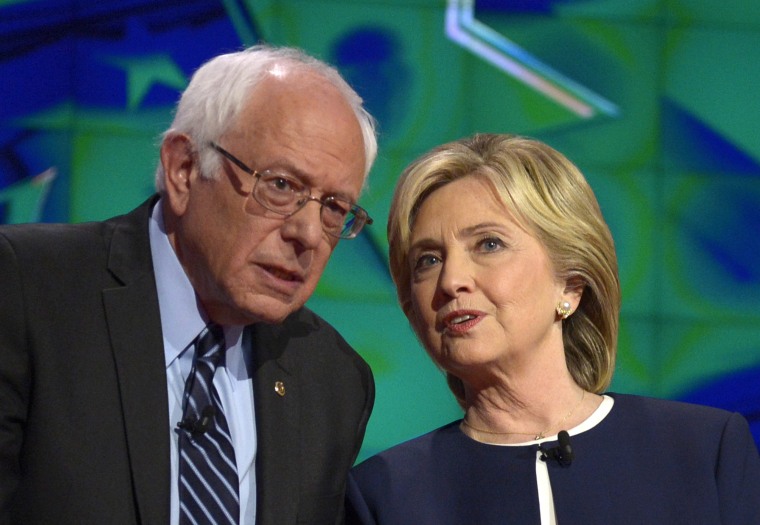Hillary Clinton and Bernie Sanders will meet in Washington Tuesday evening for a highly anticipated summit to, Democrats hope, conclude the party’s presidential primary and enlist Sanders’ support party’s efforts to fight Donald Trump.
While both camps are being fairly tight-lipped about the meeting, it is viewed as critical step towards healing the Democratic Party after an intense primary campaign, with Sanders’ millions of loyal young supporters on the line.
Sanders could extract specific promises from Clinton on his policy agenda and his role at the Democratic National Convention in July. Meanwhile, Clinton could secure Sanders’ support and commitment to campaign vigorously for her, perhaps as an emissary to young people and the left.
“I simply want to get a sense of what kind of platform she will be supporting, whether she will be vigorous in standing up for working families in the middle class, moving aggressively in climate change, healthcare for all, making public colleges and universities tuition-free," Sanders said of the meeting on NBC’s “Meet the Press” Sunday.
Related: Clinton Vows Unity While Trump Fans Flames
Clinton took the initiative, according to a campaign official, calling Sanders on the night of California’s primary last week to see if they could get together.
“She looks forward to the opportunity to discuss how they can advance their shared commitment to a progressive agenda, and work together to stop Donald Trump in the general election,” the official said.
The meeting will occur at an undisclosed location late Tuesday in Washington, on the same day the city holds the final primary of the Democratic nominating process.
Despite Sanders’ big talk as recently as a week ago about fighting to flip superdelegates at the convention, the Vermont senator has since made clear signals that he’s ready to wind down his challenge to Clinton.
However, Sanders has still yet to formally concede the race, even though Clinton was declared the Democratic presumptive nominee last week.
He met with top allies at his home in Burlington, Vermont, Sunday and has been generally laying low since a rally Thursday in Washington, which could be the last one of the campaign. At that rally and since, he has made no mention of Clinton, nor of contesting the Democratic convention.
Instead, Sanders has focused on the need to “revitalize American democracy at the local, state and federal level” with a 50-state strategy that encourages people to run for office at all levels of government, as he said after the Burlington meeting.
The key theater in what remains of the intraparty struggle is a 15-member committee that is currently hammering out a draft of the Democratic Party’s platform. Aides in both camps emerged from the first day of meetings encouraged they could find common ground.
However, the second day of meetings ran into some trouble on the Israeli-Palestinian issue, after some Sanders supporters wanted to add the word “occupation” to the platform -- a redline for pro-Israel Democrats.
It could be a sticky issue for the platform committee and therefore party unity. During the otherwise harmonious 2012 Democratic National Convention, the only skirmish on the convention floor was over whether to recognize Jerusalem as the capital of Israel.
Related: Clinton expands lead over Trump: Poll
Still, the nascent thaw between Clinton and Sanders, which just weeks ago seemed like it might never come, stands in sharp contrast to Trump’s efforts (or lack thereof) to unify his party.
Republicans have moved further away from the Republican presumptive nominee in recent days as Trump has continued to attack the judge overseeing the fraud case against Trump University.
Eight years ago, at around this same time of year, Clinton hid in the backseat of a van to evade the press and slip into Sen. Diane Feinstein’s living room, where the senator served her and Barack Obama a glass of California Chardonnay and let two rivals talk — alone.
Clinton and Obama emerged with a partnership that lasts to this day, and a commitment to unite the party for the general election.
The two had fought a bitter campaign. Clinton told the future president that her supporters need “time” and a “genuine effort to make them feel welcome” to come on board, but was confident they would, according to her 2014 autobiography, “Hard Choices.”
“Eventually almost all of them did,” Clinton wrote.

